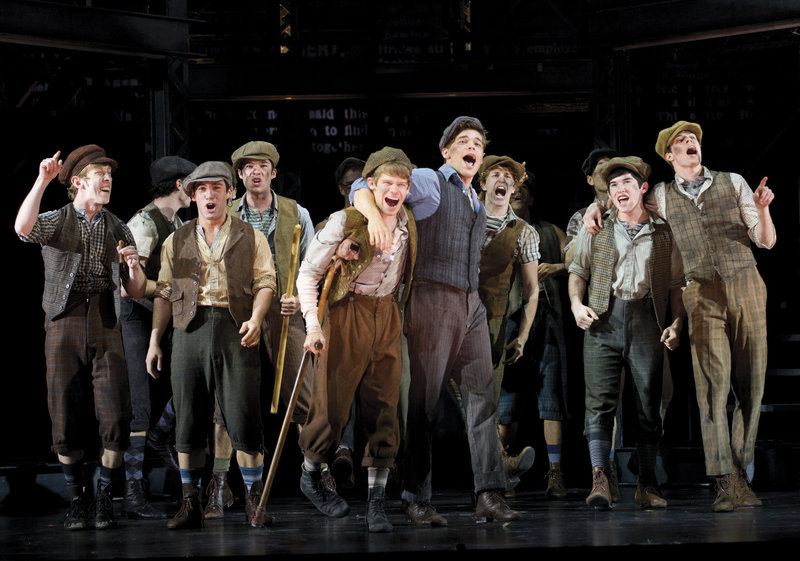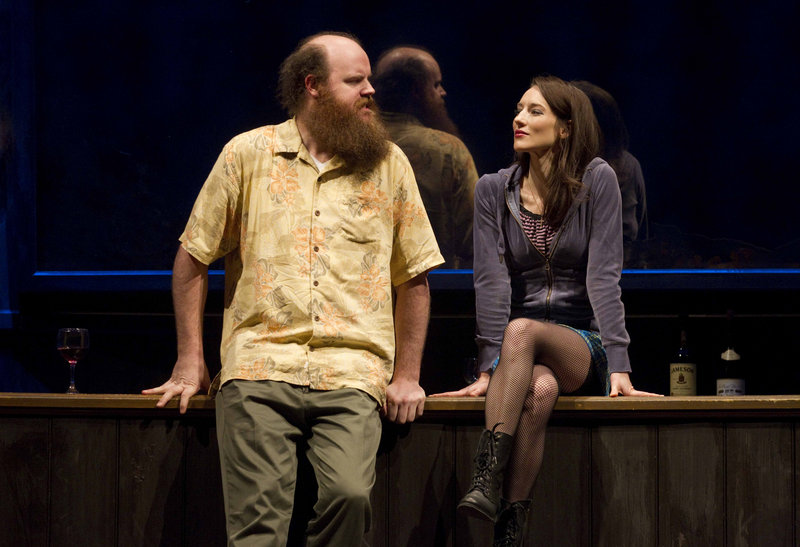NEW YORK – What with “Ghost,” “Lysistrata Jones” and other wearying disappointments, the 2012-13 Broadway season hardly will go down as a banner year for new American musicals.
Indeed, should the best-musical Tony Award go, at tonight’s ceremony, to a show other than “Once” or “Newsies” — the only remotely viable candidates for this most important of theatrical honors — the theater chatterati will be speechless and Tweetless. For a couple of seconds.
“Leap of Faith,” a missed opportunity for a more substantial look at the role of faith in Red State America, and “Nice Work If You Can Get It,” a genial but wholly artificial construct that feels more like a desire to exploit a great song catalog than a show with a coherent artistic purpose, have about as much chance of winning a Tony tonight as the NBC comedy “Smash” has of achieving belated verisimilitude.
But all the wailing and gnashing of teeth about the state of the musical — a form, it should be noted, that has survived far leaner years than this one — should not detract from the formidable and underappreciated achievement of “Once,” a musical that displays significantly more originality and breathtaking artistry than last year’s winner, “The Book of Mormon,” a hit so potent and popular it also will be featured on this year’s Tony Awards.
Sure, “Once” is based on existing material — in this case, John Carney’s 2006 independent movie about a love-lorn busker and an already-married Czech immigrant who totter precariously on the edge of Eros in Dublin.
But I’d argue that, formatively speaking, this is one of the best screen-to-stage adaptations that Broadway has ever seen, not the least because the book writer, Enda Walsh; the director, John Tiffany; and the choreographer, Steven Hoggett; are all worthy Tony winners who understand the crucial difference between film and theater.
For those of us who have sat open-mouthed on Broadway as huge scenic pieces flew or rolled through a progression of tedious and superfluous short scenes in past movies-turned-musicals such as “Nine to Five” or “Women on the Verge of a Nervous Breakdown,” “Once” stands out as a model of its form. It takes a multi-locale, cinematic story and distills it to its theatrical essence, avoiding artifice and understanding that crucial person-to-person communication on stage can only be foregrounded when there is a minimum of clutter.
“Once” is far better as a musical than as a movie (and it was a good movie) because it deepens the metaphoric weight and universality of the characters.
As beautifully performed by Cristin Milioti, who truly floats through the theater, the unnamed character of Girl feels like a guardian angel whom we’d all like to have setting us back on our feet. How come such a selfless, empowering person doesn’t show up to take care of all of us lost souls? We can, at least, go to the theater to see her.
“Newsies,” a rollicking melodrama of striking paperboys, can’t compete on an emotional or structural level, and shouldn’t win. Still, it offers a few of its own lessons for next season’s musical wannabes, not the least of which is the palpable, hurricane-strength force of offering up a fleet of lovable protagonists (making characters lovable on Broadway is harder than almost anyone thinks).
But the appeal of “Newsies” is as simple as that. These singing, dancing dudes — Crutchy, Specs and all the flat-capped pals — are eminently, endlessly likable. Almost likable enough to win a Tony on the sheer force thereof. But not quite.
This past season of Broadway plays was far healthier. Some theater-goers have construed that as a cheering aesthetic development, for which there is an argument to be made.
But I think it’s mostly a matter of economics. These days, there is not money to be made Off-Broadway, and there are plenty of actors with familiar names ready and willing to burnish their high-end reputations by making themselves available for a limited run of something substantial. And there are several busy producers with very good taste.
As a result, there were plenty of decent plays on Broadway this year, including “Other Desert Cities,” “Peter and the Starcatcher,” “Venus in Fur” and even the worthy “Chinglish,” which was not nominated for a Tony due, to my mind, to producing mistakes made between Chicago and New York. Still, the best of them all is Bruce Norris’ “Clybourne Park.”
Norris, a familiar name to Chicago theatergoers who came late to the expression of personal vulnerability, finally managed to puts his heart into a play without softening his long-honed satirical bite. And in this most clever of conceptions, he also figured out that the best way to explore the abiding racial divides in America is by looking at the separation of neighborhoods, past and present. Race has long been aligned with real estate; houses offer a way to hide distrust and discomfort for generations. That’s the Tony right there.
With the beautifully sung “The Gershwins’ Porgy and Bess” less than a complete dramatic success — Porgy was, to put it bluntly, too much of an obvious choice in that he did not demand enough of Bess — the Broadway revival of “Follies,” a sepia-toned and intensely beautiful production, looks set to dominate the slate of musical revivals, which is as it should be.
(However, it’s worth noting that Gary Griffin’s almost simultaneous revival for Chicago Shakespeare Theater was the stronger production when it came to the raw human vulnerability this exquisite piece demands).
One could see the Broadway “Follies” as a consummate, uppercase Revival, an evocation of all that very word evokes. Clearly, there is an affinity between the title and the category, an affinity that Tony voters won’t be able to resist.
Given the distinguished career of Mike Nichols and his lead actor, Philip Seymour Hoffman, the revival of “Death of a Salesman” will probably prove similarly successful, even though this production offered up an overly neurotic and youthful Willy Loman — who thus lacked the force of representative magnitude that Arthur Miller intended, just as Andrew Garfield’s Biff lacked the scars of a young man who’d already been in jail.
I’d give the best featured-actor award to Christian Borle, the “Smash” star who turned “Peter and the Starcatcher” into a compelling piece of storytelling and who has had, whatever happens tonight, an incredible year.
Send questions/comments to the editors.





Success. Please wait for the page to reload. If the page does not reload within 5 seconds, please refresh the page.
Enter your email and password to access comments.
Hi, to comment on stories you must . This profile is in addition to your subscription and website login.
Already have a commenting profile? .
Invalid username/password.
Please check your email to confirm and complete your registration.
Only subscribers are eligible to post comments. Please subscribe or login first for digital access. Here’s why.
Use the form below to reset your password. When you've submitted your account email, we will send an email with a reset code.